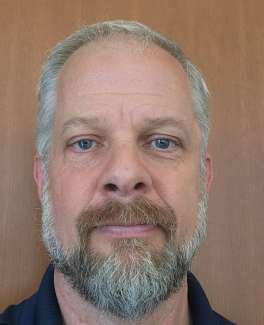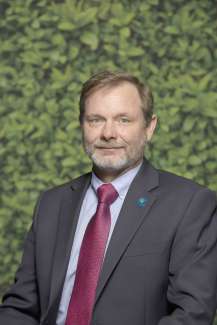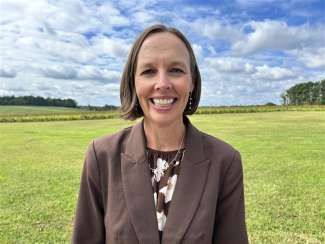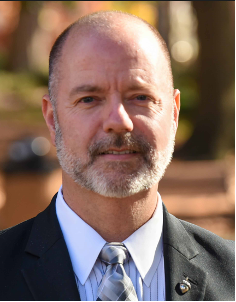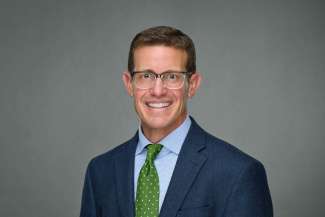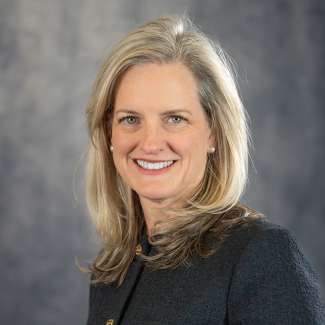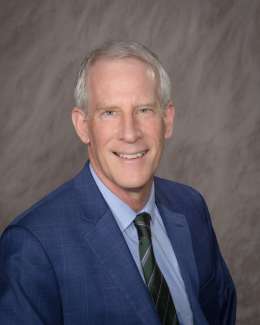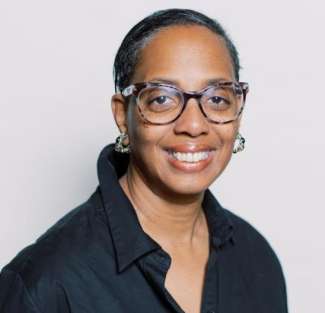Jump To:
Ed Buchan, Raleigh Water, Assistant Director
Edward Buchan currently works for Raleigh Water where he has served as the Environmental Coordinator, Information Officer and Assistant Director for the past 19 years. Prior to working with the City of Raleigh, Edward worked with an environmental consulting firm and with the North Carolina Division of Water Resources as a regulator.
In his role with Raleigh Water, Edward is responsible for managing the City’s drinking watershed protection program, water quality monitoring efforts, long range water supply planning, water treatment plant and water distribution system operations.
Edward grew up in the Raleigh area and is a graduate of North Caroline State University and is married to Amy Buchan, with whom he has a daughter who attends Millbrook High School. They reside in North Raleigh.
Whit Wheeler, Raleigh Water, Director
Whit Wheeler, PE currently serves as the Director of Raleigh Water, bringing a wealth of experience and a deep commitment to the community's essential water services. His tenure with the City of Raleigh began in 2008 as an engineer focused on managing capital improvement projects for the utility. In 2012 he was promoted to Assistant Director of Raleigh Water with primary responsibility of overseeing drinking water operations.
Whit’s comprehensive experience, from foundational engineering to executive management, culminated in his appointment as Interim Director of Raleigh Water in January 2022 and was ultimately promoted to director in March of 2023. Prior to joining the City of Raleigh, he worked as a consulting engineer designing and overseeing construction of municipal water and wastewater treatment plants and other infrastructure. As a consultant, he was the project manager and engineer of record for Raleigh Water’s Dempsey E. Benton water treatment plant. He holds a B.S. and a master's degree in civil engineering from North Carolina State University.
Today, he leads Raleigh Water with a focus on modernizing infrastructure, promoting water conservation, and upholding the department's unwavering commitment to delivering high-quality, reliable water and sewer service to the growing area which includes Garner, Knightdale, Raleigh, Rolesville, Wake Forest, Wendell and Zebulon.
Erika Bailey, Raleigh Water, Assistant Director
Erika L. Bailey is an Assistant Director for Raleigh Water who has dedicated her career to water and wastewater management, providing key leadership in the planning and completion of the City's Bioenergy Recovery Project.
Paul Kallam, Director of Transportation
Paul Kallam was appointed Director of the City of Raleigh’s Department of Transportation on September 23, 2023. Prior to that, Paul served at the Assistant Director of Transportation for 6 years leading the Infrastructure Services Division, which included Mobility, Strategy and Infrastructure, Parking, and Traffic Engineering. Paul has worked in a variety of roles since joining the City of Raleigh in 2000 as a project engineer overseeing infrastructure improvements in private development projects.
Mr. Kallam holds a Bachelor of Science in Civil Engineering from North Carolina State University. He also served 21 years in the US Navy Reserves, retiring with the rank of Lieutenant Commander, and was the 2019 awardee of the Downtown Raleigh Alliance’s Downtown Advocate Award. Outside of work, Paul enjoys working out in the yard and doing landscaping.
Megan Anderson, Office of Sustainability, Sustainability Officer
Award-Winning Sustainability Director with 18+ years of national and international experience (U.S., Africa, Asia, Australia) creating and integrating climate action, resilience, social equity, and governance standards, policies and strategies with local to international reach.
Megan is an Executive on the City of Raleigh leadership team. She leads the community and organization in transformative climate change, equity and sustainability initiatives. Community service has been the driving force behind her personal and professional life, from: starting a North Carolina-wide program for youth aging out of foster care; to teaching environmental science; to working with low-income communities in Africa and Asia, non-profits, education and government; to creating one of the first community-wide equity and resilience focused Climate Action Plans in the U.S. – Megan has made it her life’s mission to build resilient and equitable communities for a sustainable future.
Steven Rhodes, Enbridge Gas, Director of Sales
Steven Rhodes is Director of Sales for Enbridge Gas North Carolina. Rhodes has nearly two decades of experience in the natural gas industry, spanning residential, commercial and industrial markets. As Director of Sales, Rhodes leads a team responsible for driving growth across Enbridge North Carolina. He is involved with the Energy Solutions Center, the Raleigh and Durham Home Builders Association, the North Carolina Home Builders Association, The Economic Development Partnership of North Carolina, the town of Apex Planning Board, among others. Rhodes holds a bachelor’s degree in business management from Appalachian State University and a master’s degree in business administration from Pfeiffer University.
Janet Cowell, Mayor, City of Raleigh
Janet Cowell is the 63rd Mayor of Raleigh. She has close to two decades of executive leadership experience in the public, private, and non-profit sectors. Cowell comes from a tradition of public service: her father was United Methodist minister and her mother was a school teacher. Cowell served in public office from 2001-2016, including on the Raleigh City Council, as a NC State Senator, and as NC State Treasurer.
Prior to being elected mayor in 2024, Cowell served as President & CEO of the Dix Park Conservancy. Cowell started her career as a stock analyst in Asia. In recent years, she served as corporate director for two publicly-traded companies.
She graduated from the University of Pennsylvania and the Wharton School of Business.
Reid Wilson, North Carolina Department of Environmental Quality Secretary
Secretary Reid Wilson is the Secretary of the NC Department of Environmental Quality (DEQ). Secretary Wilson brings a wealth of experience in environmental protection, land conservation, and government and nonprofit leadership to DEQ. As Secretary, his priority is helping Western North Carolina rebuild and protecting our air, land, water and thus safeguarding our public health.
Previously, Secretary Wilson served as the Secretary of the NC Department of Natural and Cultural Resources. In that role, he accomplished big things in all areas of the department including the arts, culture, and heritage, K-12 educational programs, parks, wildlife and conservation, history, science, and libraries. The Secretary has held senior leadership positions at the U.S. Environmental Protection Agency, including serving as the agency’s Chief of Staff.
Kimberly Moore, Director of Civic Engagement for United States House of Representatives Member Deborah Ross
Dr. Kimberly Williams Moore is the Director of Civic Engagement for United States House of Representatives Member Deborah Ross serving District 2 in Wake County. In that role she is responsible for grants and federal funding requests in the District Office as well as all external affairs. She is the daughter of two retired educators. She began her career in pharmaceutical sales, then launched her own consulting practice while pursuing graduate degrees. Her professional career included over 14 years as the Chief Marketing Officer for North Carolina Mutual Life Insurance Company. She has also served as a strategic fundraising consultant and board member in the higher education and nonprofit sector for over 30 years. She maintains a dual adjunct professor appointment in Mass Comm and the North Carolina Central University School of Business. Dr. Moore holds a Bachelor of Arts and a Ph.D. degree in Journalism from UNC Chapel Hill, as well as a Master of Arts degree in English from North Carolina State University. Additionally, she holds a Lean Six Sigma Green Belt. Her research interests include the Triple Helix Framework of Nonprofit Management and the Black Wall Street Resilience Model. Her greatest accomplishments are her two adult sons and her almost 30 year marriage...her joy comes from serving in North East Baptist Church in the children’s ministry.
